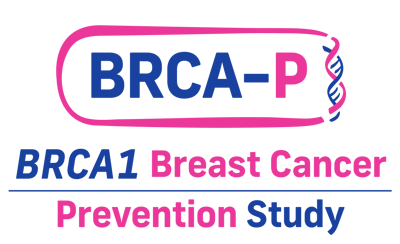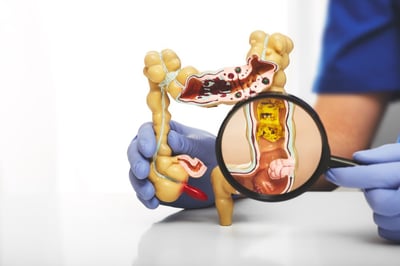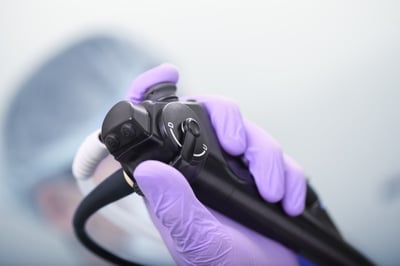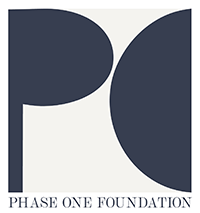Our Featured Research Page lists cancer prevention, treatment and quality of life studies enrolling people with or at high risk for hereditary cancers. You can do a quick search to filter our featured studies by cancer type, study type or key word, or a more in-depth search through clinicaltrials.gov.
Search Results: Prevention, Detection & Risk (30 results)

Prevention
Gastric cancer screening study for people with a CHD1 inherited mutation
Comparing Screening Methods for Detection of Early-Stage Gastric Cancer in People with a CHD1 Genetic Mutation
This study will compare a new technique of screening for a type of inherited gastric cancer known as diffuse hereditary gastric cancer (DHGC) to see if it can identify cancer better than the current recommended screening.

Prevention
Ovarian cancer prevention for women with a BRCA1 mutation who still have their ovaries
A Study to Compare Two Surgical Procedures in Women with BRCA1 Mutations to Assess Reduced Risk of Ovarian Cancer (SOROCk)
SOROCk [NRG-CC008] is a clinical trial studying if removal of just the fallopian tubes can reduce the risk of ovarian cancer nearly as much as removing both the ovaries and fallopian tubes among women with an inherited BRCA1 mutation. The main benefit of removing only the fallopian tubes and not the ovaries is to prevent surgically-induced menopause. The study will also examine various patient-reported quality of life outcomes. Researchers believe that most ovarian cancers first begin in the fallopian tubes, suggesting that removing the fallopian tubes only may prevent the development of ovarian cancer. This concept has never been formally testing in a clinical trial.

Prevention
Prevention study enrolling women ages 25-55 with a BRCA1 mutation
Denosumab for Breast Cancer Risk Reduction in Women With an Inherited BRCA1 Mutation (The Breast Cancer Prevention Study)
This is a study to test the effectiveness of a drug (denosumab) on preventing the development of breast cancer in women with an inherited BRCA1 mutation.
Denosumab is a drug that is currently used to treat bone loss in order to reduce the risk of broken bones in healthy people, and is also used to reduce new bone growths in cancer patients whose cancer has spread to their bones. Research has shown that denosumab may also reduce the risk of developing breast cancer in women with an inherited BRCA1 mutation.

Prevention
Prostate screening with MRI for men with Lynch syndrome (MLH1, MSH2, MSH6, PMS2, EPCAM) or a BRCA1, BRCA2, HOXB13, ATM, NBN, TP53, BRIP1, CHEK2, PALB2, RAD51C, RAD51D, or other mutation
Men at High Genetic Risk for Prostate Cancer
The National Institutes of Health has a clinical trial for men at high genetic risk for prostate cancer. This is trial is for men without prostate cancer, ages 30 to 75, who have tested positive for Lynch syndrome (MLH1, MSH2, MSH6, PMS2, EPCAM) or BRCA1, BRCA2, HOXB13, ATM, NBN, TP53, BRIP1, CHEK2, PALB2, RAD51C, RAD51D, or FANC (FANCA, FANCB, FANCC, FANCD2, FANCE, FANCF, FANCG, FANCI, FANCL, and FANCM). The trial involves screening MRI of the prostate every two years and biopsy of the prostate if the MRI is abnormal. There is no cost for travel or study-related tests.

Prevention
Prevention study for people with Lynch syndrome
Cancer Prevention Vaccine (Nous-209) for People with Lynch Syndrome
This study is testing a vaccine, known as the Nous-209 vaccine, which is intended to decrease the chances that people with Lynch syndrome will develop polyps that can turn into cancer.

Prevention
Screening study for people with a mutation linked to prostate cancer risk
PATROL Study: Prostate Cancer Screening for People AT Genetic Risk FOr Aggressive Disease
The PATROL (Prostate Cancer Screening for People AT Genetic Risk FOr Aggressive Disease) study is for people at risk for prostate cancer because they carry one or more genes that are known or suspected to increase prostate cancer risk: BRCA2, HOXB13, ATM, BRCA1, MLH1, MSH2, MSH6, PALB2, PMS2, CHEK2, RAD51D, or TP53.

Prevention
Prevention study for people with an APC mutation and FAP who have had colectomy surgery
Testing the Safety And Action of the Investigational Drug REC-4881 in People With Familial Adenomatous Polyposis (FAP) (TUPELO Study)
This study is looking at how safe and effective the research drug REC-4881 is for treating polyps in people with Familial Adenomatous Polyposis (FAP). Participants will receive the oral drug REC-4881. A participant's dose will depend on when they join the study.

Prevention
Testing A Combination Of Vaccines For Cancer Prevention In Lynch Syndrome
Lynch Syndrome Vaccine Study
This study is being done to assess the safety and effectiveness of a series of vaccines (Tri-Ad5), together with another drug (N-803) that magnifies the body’s response to vaccines, to see if there is an effect on the risk of developing colon and other cancers in LS patients.

Prevention
Prevention study for people with a BRCA1, BRCA2 or PALB2 inherited mutation who are planning to undergo risk-reducing mastectomy.
Testing a Vaccine for Preventing or Treating Triple-Negative Breast Cancer
Researchers are studying the affects of this breast cancer vaccine on the immune system in two groups of people:
- People with an inherited mutation in BRCA1, BRCA2, or PALB2 who are planning to undergo a risk-reducing mastectomy.
- For people diagnosed with stage 2 or stage 3 triple-negative breast cancer at high risk for recurrence.

Prevention
Registry and biobank for high risk people undergoing pancreatic cancer screening
Pancreatic Cancer Early Detection for People at High Risk
The study will collect clinical information, family history, and samples (blood, saliva or cheek swab) from people and families at risk for pancreatic cancer. Collecting this information and samples will create a resource to drive research necessary for early detection and prevention of pancreatic ductal adenocarcinoma (PDAC).

Prevention
People with Lynch Syndrome at risk for colon cancer
Collecting Blood and Stool Samples to Detect Colorectal Cancer or Precancerous Polyps in Lynch Syndrome Patients, CORAL Study
This study will colect blood and stool samples to detect colorectal cancer or precancerous polyps in people with Lynch syndrome.
.jpeg)
Prevention
Study to Determine if Breast Cancer Screening can be Made Better by Personalizing Each Woman’s Mammogram Schedule
The WISDOM Study: Women Informed to Screen Depending on Measures of Risk
The goal of the Wisdom Study is to determine if breast cancer screening can be made better by personalizing each woman’s mammogram schedule, compared to the current one-size-fits-all, annual approach. The Wisdom Study is designed to end the confusion about when to start and how often to have a mammogram. For more information, visit the WISDOM Study website.

Prevention
Screening using MRI for men at risk of developing prostate cancer
MRI Screening in Men at High Risk of Developing Prostate Cancer
This study will determine if prostate magnetic resonance imaging (MRI) will find prostate cancer in men at high risk of developing prostate cancer.

Prevention
This study will create a system to assess an individual’s risk of breast cancer
Study for Women at Increased Risk of Developing Breast Cancer
This study will create a system to assess an individual’s risk of breast cancer based on random sampling of normal breast tissue as well as determine new and help understand previously identified risk biomarkers.

Prevention
Diet and weight loss study for people who are overweight and at increased risk of colorectal cancer
My Best GI Eating Study
This study will test three different diets in people who are overweight and who have an increased risk of colorectal cancer. The study will look at whether these diets improve eating and possibly lead to weight loss.

Prevention
Prevention study for women at high risk for ovarian cancer
Risk Reducing Salpingectomy With Delayed Oophorectomy as an Alternative to Risk- Reducing Salpingo-oophorectomy in High Risk-Women (TUBA/WISP II)
This study is looking at whether removal of the fallopian tubes (salpingectomy) followed by removal of the ovaries (oophorectomy) at a later date closer to the time of natural menopause may reduce the risk of ovarian cancer nearly as much as removing both the ovaries and fallopian tubes at the same time (salpingo-oophorectomy) among women with an inherited BRCA1, BRCA2, BRIP1, RAD51C or RAD51D mutation. Removing the fallopian tubes only first and the ovaries at a later time closer to natural menopause may lessen menopausal symptoms while still lowering the risk for ovarian cancer.

Prevention
Prevention study for people with an APC mutation and FAP or AFAP who have polyps in remaining tissue after colectomy surgery
Testing the Drug Obeticholic Acid for Familial Adenomatous Polyposis
This study is looking at whether obeticholic acid (OCA) is safe and has a beneficial effect on the number of polyps in the small bowel and colon in people with familial adenomatous polyposis (FAP). OCA is a drug similar to a bile acid the body's liver makes. Researchers believe OCA may help keeping cancer from developing. OCA is already FDA approved to treat a type of liver disease. There have been studies showing that OCA decreases inflammation and fibrosis. However, it is not yet known whether OCA works on reducing the number of polyps in patients with FAP.

Prevention
People with a BRCA1 or BRCA2 mutation
Testing a Vaccine for Cancer Prevention in People with a BRCA1 or BRCA2 Mutation
This study will look at a new vaccine known as INO-5401 used alone or combined with a second vaccine called INO-9012. The study will test if the vaccine is safe (without large side effects) and test a new way of giving vaccines. It will also test whether the vaccine activates the immune system. A goal of this research is to reduce cancer risk in people with a BRCA1 or BRCA2 mutation. Additional studies will be needed to learn if this vaccine approach lowers cancer risk in mutation carriers.

Prevention
Prevention study for people with Lynch syndrome
A Study Comparing Two Anti-inflammatory Medications Naproxen or Aspirin for Cancer Prevention in Lynch Syndrome
The trial is enrolling people with Lynch syndrome. On average, the length of this study will last one year from the start of enrollment to completion. The study will measure the effect of naproxen or aspirin on the immune cells in the gastrointestinal tract of people with Lynch syndrome. The trial will also evaluate any symptoms from the medications and any other changes of the colon and rectum.

Prevention
Screening study for people at high risk for pancreatic cancer
Pancreatic Cancer Screening Study (CAPS5)
CAPS5 is a study looking at screening for early cancer in people with an elevated lifetime risk of developing pancreatic cancer. The goal is to study biomarkers derived from images and tissue samples (blood, pancreas fluid, duodenal fluid) for the early detection of pancreatic cancer and precancerous lesions.

Prevention
Study for people undergoing DIEP flap reconstruction
Restoring Sensation after DIEP Flap Reconstruction
The goal of this study is to look at how well a nerve graft works for improving sensation to the reconstructed breast after mastectomy in people undergoing DIEP flap reconstruction (deep inferior epigastric perforator flap).

Prevention
People at high risk for prostate cancer due to an inherited mutation
Prostate Cancer Genetic Risk Evaluation and Screening Study (PROGRESS)
This study will look at how enhanced prostate cancer screening using MRI will improve early detection rates and further understanding of how inherited mutations can lead to development of prostate cancer.

Prevention
Observational study for people with family history of pancreas cancer or an inherited mutation linked to pancreatic cancer risk.
Blood Markers of Early Pancreas Cancer
The purpose of this study is to try to find markers of early pancreatic cancer for individuals at higher-than-average risk, expedite the diagnosis in individuals with symptoms, and substantially improve an individual's chance of surviving the disease.

Prevention
Interview for people who's genetic test results were reclassified
Exploring the Psychosocial Implications of Individuals with a Genetic Test Result that was Later Reclassified
Researchers at Bay Path University are conducting virtual/phone interviews with individuals who have received a reclassified genetic test result to cancer related genes. This study will help researchers learn the psychosocial implications and experiences of those who have received a reclassified genetic test result when undergoing hereditary cancer gene testing, (for example, your original genetic test results showed a variant of uncertain significance that was later found to be harmful or harmless).

Prevention
Latinas with a high risk of breast cancer
Helping Latinas Understand Their Risk for Breast Cancer and Get Breast Cancer Care
This study will teach Latinas with a high risk of breast cancer about how diet, exercise, ethnicity, genetics and screening and prevention guidelines may impact their likelihood for developing breast cancer.

Prevention
Screening for prostate cancer using upright MRI
Upright MRI for Prostate Cancer Screening
This study will compare the effectiveness of an upright magnetic resonance imaging (MRI) compared to prostate specific antigen (PSA) and current MRI imaging for prostate cancer screening.

Prevention
People with a genetic mutation in BRCA1, BRCA2 or Lynch syndrome who have relatives who have not been tested
IGNITE-TX - Identifying Individuals for Genetic Testing for Familial Cancer
The IGNITE-TX study is all about helping people with a genetic mutation in BRCA1, BRCA2 or Lynch syndrome talk to their family members about their risk for cancer and find the best way to get family members tested.

Prevention
Atorvastatin ± Aspirin for Colorectal Cancer Prevention for People with Lynch Syndrome
This study will look at how well atorvastatin (a cholesterol lowering agent) works with or without aspirin in preventing colorectal cancer in people with Lynch syndrome. Atorvastatin may lower the risk of developing cancers in the colon and rectum. Aspirin may reduce the risk of colon polyps and colon cancers. Giving atorvastatin and aspirin may work better at reducing the risk of colorectal cancer (CRC) in high-risk individuals with Lynch syndrome.

Prevention
Developing a Test for the Detection of Ovarian Cancer
The purpose of this study is to develop a test for early detection of ovarian cancer. Two patient populations are included in this study: women scheduled for surgery or testing for suspected but undiagnosed ovarian/fallopian tube cancer, and women with a BRCA1 or BRCA2 mutation who are scheduled for a risk-reducing salpingo-oophorectomy. The study will examine DNA from a washing of the uterus (womb) and proteins found in the blood to see if they can detect ovarian cancer.

Prevention
Preliminary Evaluation of Screening for Pancreatic Cancer in Patients with an Inherited Genetic Risk Due to a BRCA1, BRCA2, PALB2 or ATM Mutation
Improved screening for pancreatic cancer in high-risk groups, such as people with an inherited BRCA1, BRCA2, ATM, or PALB2 mutation, may help find cancer early and improve survival rates. People enrolled in this study will undergo screening using endoscopic ultrasound or MRI of the abdomen.

